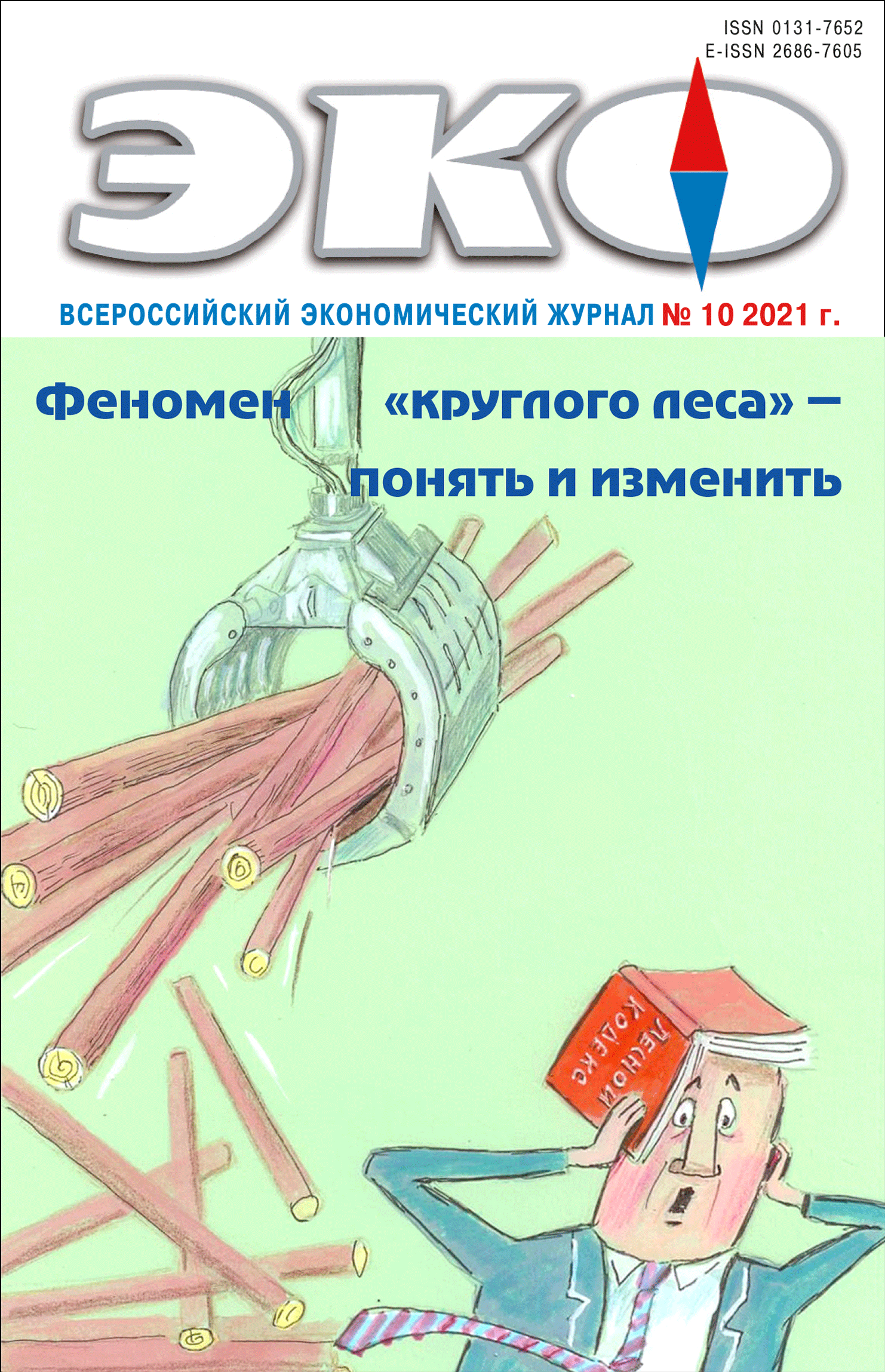Тема номера: Феномен "круглого леса" – понять и изменить
Natural Assets in the Green Economy: a Case of Balneological Resources in Transbaikalia
Published 2021-09-27
Keywords
- nature parks,
- economies of scale,
- wellness recreation,
- ecotourism,
- basic infrastructure
How to Cite
1.
Glazyrina И, Pomazkova Н, Darmaeva О. Natural Assets in the Green Economy: a Case of Balneological Resources in Transbaikalia. ECO [Internet]. 2021 Sep. 27 [cited 2026 Jan. 19];51(10):65-90. Available from: https://ecotrends.ru/index.php/eco/article/view/4323
Abstract
The paper considers problems arising from developing the balneological potential in rural areas of Siberia and the Russian Far East. Examining the case of Arey Nature Park located in the Trans-Baikal Territory, the authors analyze the reasons why natural assets do not become the basis for developing the local green economy, unlike the situation with similar resources in many European countries. The long and sustained coexistence of «green» demand and «brown» supply, which is a manifestation of a specific institutional trap, is revealed. The authors prove that in situations where economies of scale cannot foster growth, it is necessary to integrate the regional investment policy with the policy of supporting small and medium-sized businesses in the recreational and health sector of the economy.References
- Воробьева И. Б., Власова Н. В., Белозерцева И. А., Гагаринова О. В. Туризм на территории юго-западного побережья озера Байкал как фактор обострения экологических проблем // Современные проблемы сервиса и туризма. 2019. Т. 13. № 1. С. 70–78. DOI: 10.24411/1995–0411–2019–10108
- Глазырина И. П., Дармаева О. Ц. Роль и место бальнеологических ресурсов в экономике Забайкальского края // Вестник Забайкальского государственного университета. 2020. Т. 26. № 4. С. 94–107. DOI: 10.21209/2227–9245–2020–26–4–94–107.
- Замана Л. В. Углекислые воды Даурской гидроминеральной области (Восточное Забайкалье) // Вопросы курортологии, физиотерапии и лечебной физкультуры. 2018. Т. 95. № 4. С. 69–74. DOI: 10.17116/kurort20189504169.
- Корытный Л. М., Евстропьева О. В. О разработке правил организации туризма и отдыха в центральной экологической зоне Байкальской природной территории // Современные проблемы сервиса и туризма. 2018. Т. 12. № 3. С. 31–42. DOI: 10.24411/1995–0411–2018–10303.
- Минакир П. А., Суслов Д. В. Прямые иностранные инвестиции в экономике российского Дальнего Востока // Экономические и социальные перемены: факты, тенденции, прогноз. 2018. Т. 11. № 3. С. 41–56. DOI: 10.15838/esc.2018.3.57.3
- Помазкова Н. В. Ландшафтно-экологический мониторинг природного парка «Арей» // Ученые записки Крымского федерального университета. География. Геология. 2020. Т. 6. № 3. С. 240–255. DOI: 10.37279/2413–1717–2020–6–3–240–255.
- Рогожников В. А. Гигиеническая оценка природных факторов озера Арей Читинской области. Автореф. дисс. канд.мед.наук. Иркутск, 1995.
- Рыбаковский Л. Л. Факторы и причины миграции населения, механизм их взаимосвязи // Народонаселение. 2017. Т. 2 (76). С. 51–61.
- Савченков М. Ф. Возможности использования природных ресурсов для оздоровления населения (Байкальский регион) // Сибирский медицинский журнал (Иркутск). 2010. Т. 93. № 2. С. 110–113.
- Brown T. L., Decker D. J. Research Needs to Support Community-Based Wildlife Management: Global Perspectives // Human Dimensions of Wildlife. 2005. Vol. 10. No. 2. Pp.137–140. Doi: 10.1080/10871200590931824.
- Fletcher R., Neves K. Contradictions in Tourism: The Promise and Pitfalls of Ecotourism as a Manifold Capitalist Fix // Environment and Society. 2012. Vol. 3. No. 1. Pp. 60–77. Doi: 10.3167/ares.2012.030105.
- Glazyrina I. P. Tourism in the East and West of Russia: A Comparative Analysis // Geography and Natural Resources. 2019. Vol. 40. No. 4. Pp. 299–305. Doi: 10.1134/S1875372819040012.
- Hardin G. The Tragedy of the Commons // Science. 1968. Vol. 162. No. 3859. Pp. 1243–1248. DOI: 10.1126/science.162.3859.1243.
- Hunt C. A., Durham W. H., Driscoll L., Honey M. Can ecotourism deliver real economic, social, and environmental benefits? A study of the Osa Peninsula, Costa Rica // Journal of Sustainable Tourism. 2015. Vol. 23. No. 3. Pp. 339–357. DOI: 10.1080/09669582.2014.965176.
- Korytny L., Gagarinova O. Around Baikal: on the causes of ecological problems // 4th Vinogradov Conference “Hydrology: from Learning to Worldview” in memory of outstanding Russian hydrologist Yury Vinogradov, VC2020. 2020. Pp. 03009. DOI: 10.1051/e3sconf/202016303009.
- Martinez-Alier J., Kallis G., Veuthey S., Walter M., Temper L. Social Metabolism, Ecological Distribution Conflicts, and Valuation Languages // Ecological Economics. 2010. Vol. 70. No. 2. Pp. 153–158. Doi: 10.1016/j.ecolecon.2010.09.024.
- Ostrom E., Burger J., Field C. B., Norgaard R. B., Policansky D. Revisiting the Commons: Local Lessons, Global Challenges // Science. 1999. Vol. 284. No. 5412. Pp. 278–282. DOI: 10.1126/science.284.5412.278.
- Ostrom E. A General Framework for Analyzing Sustainability of Social-Ecological Systems // Science. 2009. Vol. 325. No. 5939. Pp. 419–422. DOI: 10.1126/science.1172133.
- Pilyasov A. N. Regional investment policy: how to overcome the path dependence // Regional Research of Russia. 2019. Vol. 9. No. 4. Pp. 340–349. DOI: 10.1134/S2079970519040099.
- Stronza A. The Economic Promise of Ecotourism for Conservation // Journal of Ecotourism. 2007. Vol. 6. No. 3. Pp. 210–230. DOI: 10.2167/joe177.0.
- Stronza A. L., Hunt C. A., Fitzgerald L. A. Ecotourism for conservation? // Annual Review of Environment and Resources. 2019. Vol. 44. Pp. 229–253. DOI: 10.1146/annurev-environ-101718–033046.
- Verband Deutscher Naturparke e. V. Living Landscapes: Europe’s Nature, Regional, and Landscape Parks – model regions for the sustainable development of rural areas. Bonn, 2017. 174 p. URL: https://www.european-parks.org/publications/book-living-landscapes (дата обращения: 25.03.2021).
- Vladimirova V. Politics of the green economy in Russia’s European North // Journal of Political Ecology. 2017. Vol. 24. No. 1. Pp. 296–323. DOI: 10.2458/v24i1.20810.
- Weinberg A., Bellows S., Ekster D. Sustaining Ecotourism: Insights and Implications from Two Successful Case Studies // Society and Natural Resources. 2002. Vol. 15. No. 4. Pp. 371–380. DOI: 10.1080/089419202753570846.
- Wight P. Sustainable Ecotourism: Balancing Economic, Environmental and Social Goals within an Ethical Framework // Tourism Recreation Research. 1995. Vol. 20. No. 1. Pp. 5–13. DOI: 10.1080/02508281.1995.11014727.
- Zhong L., Zhang X., Deng J., Pierskalla C. Recreation ecology research in China’s protected areas: progress and prospect // Ecosystem Health and Sustainability. 2020. Vol. 6. No. 1. Pp. 1–12. Doi: 10.1080/20964129.2020.1813635.

